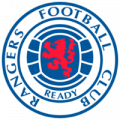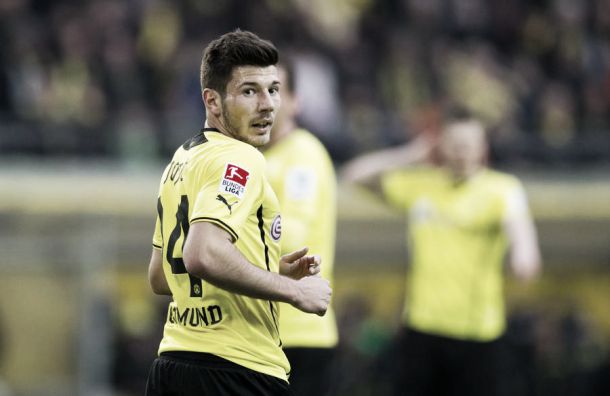Just 18 months after joining the club, Milos Jojic has left Borussia Dortmund, making the switch to FC Köln.
Jojic joined Dortmund in January 2014 for a fee in the region of £2 million. He signed a four-year deal and was expected to bring plenty to the team's midfield after an impressive spell with Partizan in his home country of Serbia, one which saw him score 11 goals in 50 games and win the Serbian SuperLiga.
He joined the German club having just been made a full Serbian international a few months before too and looked sure to add to the list of bright young talent the team could boast.
The question is, what went wrong for him at Westfalenstadion?
Strong start to life in Germany
To say things got off to a good start with Dortmund would simply be an understatement. Jojic made his debut for the club on February 15 2014 and scored with his first touch, just 17 seconds after coming on as a substitute, as his new team won 4-0 against Eintracht Frankfurt.
Nine more appearances followed that season, including four consecutive starts at the very end of the campaign. Jojic added another three goals to his tally in this time, as well as an assist, and was certainly a player the fans were looking forward to seeing more of in the 2014-15 season.
A good distributor of the ball with a fierce shot from distance and the confidence to run at players, Jojic was a joy to watch for the fans, as well as an asset to his team by helping pose an attacking threat as well as getting stuck in and tracking back.
Poor management by Klopp
Jojic's first full season hardly lived up to the expectations he set in his appearances at the end of the 2013-14 season though, with the fact that Dortmund struggled as a team largely responsible for this.
The club scrapped to a seventh placed finish this year, having sat bottom of the table at the beginning of February. They just clinched a Europa League spot thanks to a recovery run of three defeats in their last 15 games, but Jojic featured in just one of these matches - and even that was a ten minute appearance off the bench in the final game of the season.
Perhaps this was harsh and in fact poor management from Jurgen Klopp regarding the 23-year-old.
Jojic started Dortmund's first six games, but was generally poor and therefore dropped for the game against Hamburger SV in week seven. However, Klopp was still confident that the player had plenty to add and brought him on at half time in this game to swing it in Dortmund's favour. Yet, he failed to have an impact as his side lost 1-0.
Four games passed without the Serb getting a look in and then, just as he thought he was getting back into the team with two consecutive appearances off the bench in November, he was completely cast aside for the remainder of the season until popping up on the final day in a 3-2 win over Werder Bremen.
The player sat on the sidelines for 20 successive league games without even being told to warm-up.
This wasn't because he was simply not good enough for the team, as he had already shown in the season prior what he could do, but because Klopp was going through a phase of just not believing in him.
Jojic should've been re-integrated into the side bit by bit to regain his confidence and re-adjust him to the league, similar to how he was managed at the end of the 2014-15 season. Cameos as a substitute when Dortmund were winning would've helped especially, as leaving him to waste away on the bench was not good for him as a player, nor good for the team as a potential game-changer saw his affect on matches reduced by a decrease in match fitness, sharpness and confidence.
What really baffled many during this time of the player being left on the sidelines was simply the fact that he wasn't doing anyone any good there - why wasn't he loaned out elsewhere or given minutes in Dortmund's B team?
Klopp decided in October that Jojic was no longer a starter or even a regular in the side off the bench, so why didn't he look to send him out on loan somewhere in January?
Surely there would've been plenty of interest in a young, creative, Serbian international, especially from sides towards the bottom of the Bundesliga who were looking to turn their season around after a poor first half?
Jojic would stay at Dortmund though and feature just once between the opening of the January transfer window and the end of the season. With a lack of sharpness from a lack of minutes, it's hard to imagine that the player will have impressed greatly in training in comparison to others and with so much at stake, Klopp was not willing to risk playing him.
Dortmund struggled so Jojic struggled
This is something to perhaps defend Klopp's decision to drop him so harshly - the desperate need for improvement. With the team's situation so dire, Klopp was always the more likely to start a player in midfield who was more experienced and more proven in the league to increase the chances of survival and a jump up the standings.
Unfortunately, Jojic did not fit this criteria. Despite a good second half of the season last year, he was still adapting to the Bundesliga and the step up from the Serbian SuperLiga when he came into the 2014-15 season.
His good start to life as a Dortmund player came when they were playing marvellous football and winning games too. Playing well whilst this is happening is extremely different to playing well in the top flight when your team are becoming a big part of a relegation dogfight.
Jojic made a name for himself in Serbia by flourishing in a successful Partizan team, and so the switch to a successful Dortmund team will not have been as difficult as many may imagine, especially with some of their world-class talent around to help the player out on the pitch.
However, an unexpected drop in form by the team will have been a shock to the system for Jojic at his young age, especially given his inexperience in the situation. He was part of a struggling Teleoptik team in Serbia for a couple of years on loan as a teenager, but they play third tier football and thus Jojic will have excelled regardless given his superior quality in comparison to the division.
The difference between this and a relegation battle in the Bundesliga, one of Europe's biggest and best leagues, is huge and he really struggled to adapt to playing football for three crucial points, as opposed to playing nice football for a decent result.
Lack of guidance
Another reason Jojic failed to make a real impact at Dortmund this season is because of the lack of key figures around him to help the player out in this unfamiliar situation.
At the end of last season, Dortmund had essentially all of their key players fit and this was a huge reason they, and Jojic, played so well and finished second in the league again.
However, an injury crisis this year saw the likes of Mats Hummels and Marco Reus absent for big chunks of the campaign, and this had a telling affect on not only the team's performance, but the performances of certain individuals too - such as Jojic.
Reus is such a key player for the whole team, and his absence prevented Jojic from really flourishing on the attack this year, as well as several other teammates. The German international's influence on Dortmund cannot be understated as when he plays and plays well, the whole team is lifted.
The departure of Robert Lewandowski meant another key player was missing too, whilst Hummels, the club captain, is an obviously significant absence.
On top of these, the likes of Nuri Sahin and Sebastian Kehl were in and out of the side through injury, and these are the players who really helped Jojic get used to life in Dortmund's midfield last season by offering him that support and advice he needed to adapt to a new league and team.
Having fit in so well last year, Jojic was suddenly missing all the familiar faces that helped him feel so comfortable and relaxed in the middle of the park at Westfalenstadion and it certainly unsettled him.
The likes of Ilkay Gundogan, Kevin Kampl and Shinji Kagawa came in and did a good job for the side, but they were not the players Jojic was looking for for assistance and guidance and with all the key absences in the team this season, the Serb looked lost at times, whilst the lack of faith put in him by Klopp as the season progressed did not help either.
Time to move on
The 23-year-old showed great potential at times with Dortmund, but he was always going to struggle in the season gone with the team under-performing and so many big players missing.
Jojic needs more time to adapt to the league before he can really make his mark in one of the big teams, and thus perhaps a loan to Köln would've been a better option for Dortmund as the player looks certain to develop into a fantastic footballer, he just needs game time to allow him to rebuild his confidence.
However, new manager Thomas Tuchel may be looking to start afresh in the squad after their dismal season last time out, and therefore views Jojic as surplus to requirements in a team that already boasts the likes of Kampl, Sahin, Kirch, Gundogan and Kagawa, as well as Jakub Blaszczykowski, Sven Bender and Henrikh Mkhitaryan.
The move to Köln is certainly good for Jojic, nonetheless, as he can set a foundation to build upon by establishing himself at the club, using them as a stepping stone for him to move to a bigger team like Dortmund again.
The switch will give the player a chance to adapt to the Bundesliga whilst trying something new, having spent most of his career at the top of the league table. He will also be given the opportunity to show why he deserves a regular spot in Serbia's national team by excelling with Köln and will certainly add plenty to their squad.
Various factors contributed to Jojic's second season syndrome at Dortmund, but all were certainly fixable and the sale of the 23-year-old could be one Dortmund go on regret in the future.










































